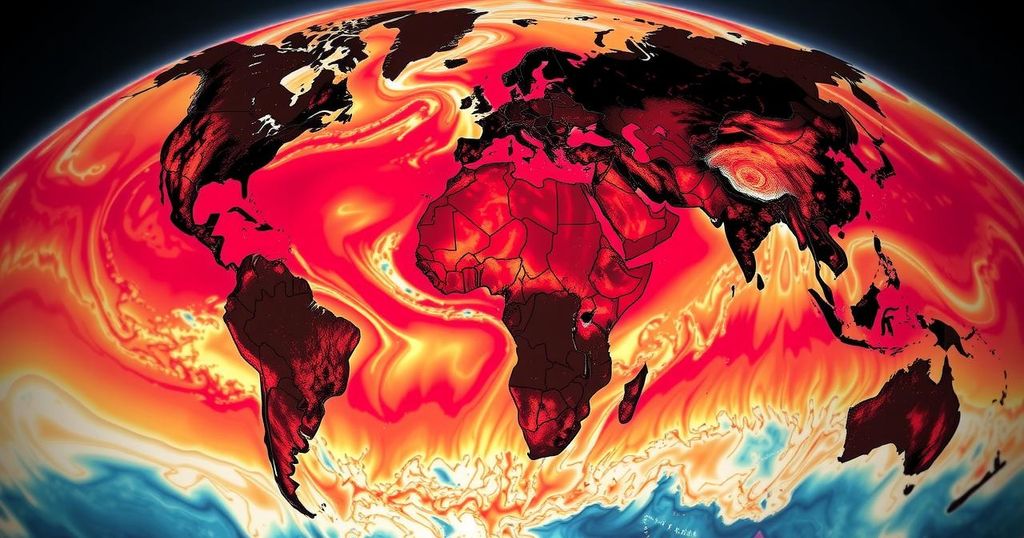2024 Marks Record-Breaking Global Temperatures, Urges Immediate Climate Action

In 2024, global temperatures reached unprecedented highs, exceeding critical limits for the first time according to climate monitoring agencies. The United Nations called for urgent climate action, highlighting that temperatures are now 1.55°C above pre-industrial levels. Despite the individual yearly recordings exceeding the 1.5°C threshold, there is still a chance to prevent catastrophic climate consequences if immediate actions are taken by global leaders.
The year 2024 has been marked as the hottest on record, with average global temperatures exceeding significant warming thresholds for the first time. The United Nations emphasizes the urgent need for unprecedented climate action as global temperatures have consistently surpassed preindustrial levels by 1.55 degrees Celsius. While the Paris Agreement’s goal of maintaining a 1.5°C increase may not be permanently breached, this trend poses serious implications for climate stability. The World Meteorological Organization (WMO) confirmed that the extraordinary high temperatures from 2024 contribute to a decade-long streak of escalating warmth.
Key figures from the UN, including Secretary-General Antonio Guterres, have underscored the reality of climate change, stating, “Global heating is a cold, hard fact.” The ongoing challenges faced due to rising temperatures are compounded by the impact of climate skeptics in political positions, as scientists predict continued high temperatures in the near future. Extreme weather events in 2024 resulted in significant destruction and costs estimated to exceed $300 billion, demonstrating the immediate need for comprehensive climate policy reforms.
The findings of climate monitoring agencies indicate that the past two years have experienced unprecedented temperature changes, with historical data highlighting a concerning trend. Celeste Saulo, the WMO chief, clarified that despite the alarming temperature rise within a single year, these measurements are evaluated over decades in the context of global warming goals. Meanwhile, experts stress that even slight deviations beyond the 1.5°C threshold could trigger catastrophic climate changes, underscoring the urgency for global action to mitigate future risks.
In addition to the immediate implications of climate change, 2024 witnessed tragic events worldwide as extreme weather caused numerous fatalities and unprecedented natural disasters. As stated by Samantha Burgess, deputy director at Copernicus, “We are now teetering on the edge of passing the 1.5C level,” highlighting the precarious position in which the planet currently stands.
In conclusion, the patterns established in 2024 illustrate the pressing need for decisive action to combat climate change. The scientific consensus indicates that we are approaching critical climate thresholds, necessitating a unified global response. The future climate outcome largely depends on political will and public commitment to reducing greenhouse gas emissions. As expressed by Carlo Buontempo from Copernicus, “The future is in our hands — swift and decisive action can still alter the trajectory of our future climate.”
The article discusses the groundbreaking reports from various climate monitoring agencies indicating that 2024 has recorded the highest average global temperatures in history. This shift represents a significant concern regarding the increase in global warming, particularly in relation to the internationally agreed-upon limit of 1.5 degrees Celsius established in the Paris Agreement. The impacts of climate change, including extreme weather events and economic repercussions, are emphasized, reflecting the urgent need for global intervention to mitigate its effects. This situation has spurred calls for immediate action from world leaders and the scientific community to prevent a full-blown climate disaster.
The overarching theme of the article emphasizes that 2024’s record-breaking temperatures signify an urgent call for climate action. The consistent rise in global temperatures highlights the seriousness of climate change and warns that we are nearing a critical tipping point. Unless immediate and effective measures are taken, the world risks severe ecological and economic consequences. Global cooperation and commitment to the principles of the Paris Agreement are imperative to safeguarding the planet’s future.
Original Source: www.fox28spokane.com






